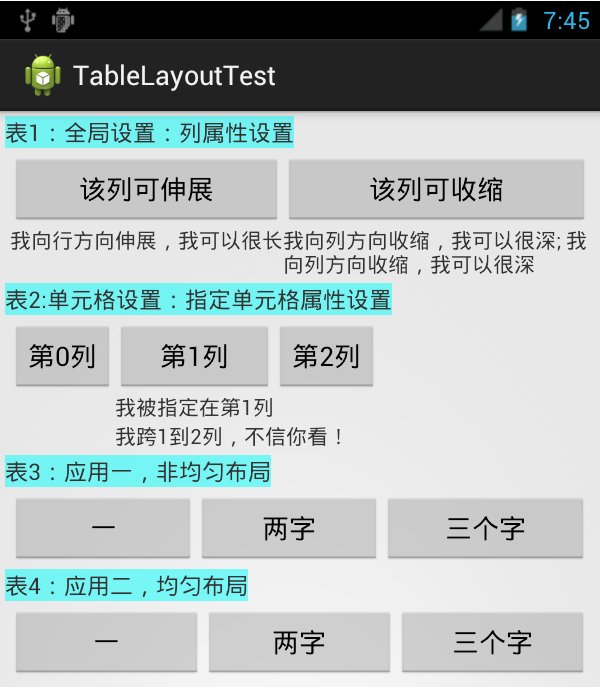Android 布局之TableLayout
Posted youseiraws
tags:
篇首语:本文由小常识网(cha138.com)小编为大家整理,主要介绍了Android 布局之TableLayout相关的知识,希望对你有一定的参考价值。
1 TableLayout简介
TableLayout是表格布局。TableLayout 可设置的属性包括全局属性及单元格属性。
1.1 全局属性
有以下3个参数:
android:stretchColumns
设置可伸展的列。该列可以向行方向伸展,最多可占据一整行。
android:shrinkColumns
设置可收缩的列。当该列子控件的内容太多,已经挤满所在行,那么该子控件的内容将往列方向显示。
android:collapseColumns
设置要隐藏的列。
示例:
android:stretchColumns="0" ---- 第0列可伸展
android:shrinkColumns="1,2" ---- 第1,2列皆可收缩
android:collapseColumns="*" ---- 隐藏所有行
说明:列可以同时具备stretchColumns及shrinkColumns属性,若此,那么当该列的内容N多时,将“多行”显示其内容。(这里不是真正的多行,而是系统根据需要自动调节该行的layout_height)
1.2 单元格属性
有以下2个参数:
android:layout_column
指定该单元格在第几列显示
android:layout_span
指定该单元格占据的列数(未指定时,为1)
示例:
android:layout_column="1" ---- 该控件显示在第1列
android:layout_span="2" ---- 该控件占据2列
说明:一个控件也可以同时具备这两个特性。
2 TableLayout示例
创建一个activity,包含几组TableLayout;每个TableLayout分别设置不同的属性。
layout文件
<?xml version="1.0" encoding="utf-8"?> <LinearLayout xmlns:android="http://schemas.android.com/apk/res/android" android:orientation="vertical" android:layout_width="fill_parent" android:layout_height="fill_parent" android:padding="3dip" > <!-- 第1个TableLayout,用于描述表中的列属性。第0列可伸展,第1列可收缩 ,第2列被隐藏--> <TextView android:text="表1:全局设置:列属性设置" android:layout_height="wrap_content" android:layout_width="wrap_content" android:textSize="15sp" android:background="#7f00ffff"/> <TableLayout android:id="@+id/table1" android:layout_width="fill_parent" android:layout_height="wrap_content" android:stretchColumns="0" android:shrinkColumns="1" android:collapseColumns="2" android:padding="3dip"> <TableRow> <Button android:text="该列可伸展"/> <Button android:text="该列可收缩"/> <Button android:text="我被隐藏了"/> </TableRow> <TableRow> <TextView android:text="我向行方向伸展,我可以很长"/> <TextView android:text="我向列方向收缩,我可以很深; 我向列方向收缩,我可以很深"/> </TableRow> </TableLayout> <!-- 第2个TableLayout,用于描述表中单元格的属性,包括:android:layout_column 及android:layout_span--> <TextView android:text="表2:单元格设置:指定单元格属性设置" android:layout_height="wrap_content" android:layout_width="wrap_content" android:textSize="15sp" android:background="#7f00ffff"/> <TableLayout android:id="@+id/table2" android:layout_width="fill_parent" android:layout_height="wrap_content" android:padding="3dip"> <TableRow> <Button android:text="第0列"/> <Button android:text="第1列"/> <Button android:text="第2列"/> </TableRow> <TableRow> <TextView android:text="我被指定在第1列" android:layout_column="1"/> </TableRow> <TableRow> <TextView android:text="我跨1到2列,不信你看!" android:layout_column="1" android:layout_span="2" /> </TableRow> </TableLayout> <!-- 第3个TableLayout,使用可伸展特性布局--> <TextView android:text="表3:应用一,非均匀布局" android:layout_height="wrap_content" android:layout_width="wrap_content" android:textSize="15sp" android:background="#7f00ffff"/> <TableLayout android:id="@+id/table3" android:layout_width="fill_parent" android:layout_height="wrap_content" android:stretchColumns="*" android:padding="3dip" > <TableRow> <Button android:text="一" ></Button> <Button android:text="两字"></Button> <Button android:text="三个字" ></Button> </TableRow> </TableLayout> <!-- 第4个TableLayout,使用可伸展特性,并指定每个控件宽度一致,如1dip--> <TextView android:text="表4:应用二,均匀布局" android:layout_height="wrap_content" android:layout_width="wrap_content" android:textSize="15sp" android:background="#7f00ffff"/> <TableLayout android:id="@+id/table4" android:layout_width="fill_parent" android:layout_height="wrap_content" android:stretchColumns="*" android:padding="3dip" > <TableRow> <!-- --> <Button android:text="一" android:layout_width="1dip"></Button> <Button android:text="两字" android:layout_width="1dip"></Button> <Button android:text="三个字" android:layout_width="1dip"></Button> </TableRow> </TableLayout> </LinearLayout>
点击下载:源代码
运行效果:如图

以上是关于Android 布局之TableLayout的主要内容,如果未能解决你的问题,请参考以下文章
Android精通:TableLayout布局,GridLayout网格布局,FrameLayout帧布局,AbsoluteLayout绝对布局,RelativeLayout相对布局